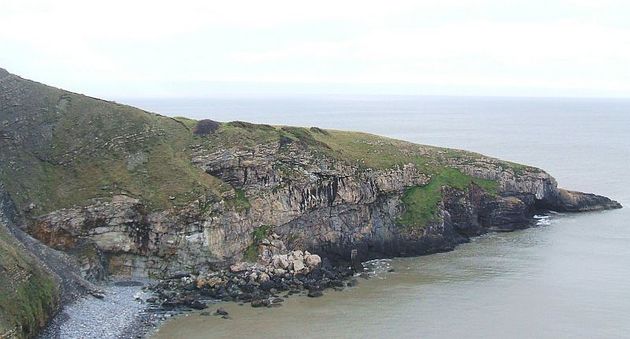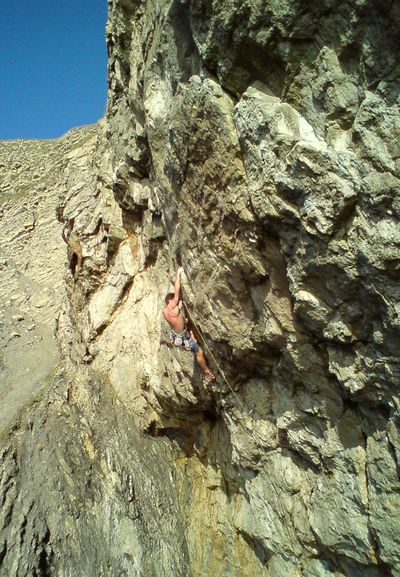The SWMC Wiki is currently under review.
Witches Point
GR 884726 to 886726
Contents
[hide]TIDAL STATUS
Apart from White Witch Crag, the crag is not really tidal. Only on high spring tides are routes from Staple Diet leftward and the belay platforms from Hanging By A Thread rightward tidal. The direct approach across the beach is tidal and cut off 1½ hours or so either side of high tide. Even then it is possible to abseil in or scramble out via Tufa Terrace, or scramble out to the Gantry. For Witches Cave, 2 hours either side of low water.
BOLTING POLICY
Retro-bolting permissible with first ascensionists permission. Replacement of worn fixed gear on a point for point basis with bolts is permissible. New sports routes allowed.
PREAMBLE
This is one of the showpiece sports crags of the area. Seepage is only a problem from October to March and outside this period, the crag dries surprisingly quickly. The Dunraven Cliff section has superb quality compact limestone very much reminiscent of Lower Pen Trwyn. This is the ideal summer venue - shade at the crag, sun 100m away on the Beach - wine, barbecues, a private section of Southerdown beach when the tide cuts off the maddening hordes. Any time else, bring a down jacket, as an unfavourable wind across the beach can be chilling. The generally non-tidal nature means a day can easily be split between Ogmore and Witches Point.
ACCESS
From M4 J35 follow the A473 southbound (towards Bridgend) for approximately 6 km.
After passing under a steel railway bridge take a left at the next junction, a traffic light controlled roundabout, onto the B4265 (St. Brides).
Follow this road until passing out of St. Brides village (approximately 3km) and take a right to Southerndown/Ogmore (B4524).
Follow the B4524 to a sharp right-hand bend at the Three Golden Cups pub, on this bend turn left down the smaller road sign-posted ‘Beach’.
The crag is in the far left corner of the beach when looking out to sea. White Witch Crag is the obvious square buttress 150m to the right.
The easiest approach when the tide is good is to cut straight across the beach to either crag.
If the tide is in, follow a path up the shoulder of the hill on the far side of the car park and then walk down towards the point itself. About 100m down from the crest is a hollow on the right, with a vague path. This leads (carefully) down to Tufa Terrace. Abseil into the main crag from here.
About 150m further on a vaguer path cuts down right and doubles back along the cliff to reach the Gantry Area.
Witches Cave is reached 150m further on, below some abseil stakes about 75m back from the tip of the point.
DESCENTS
All sport routes at Witches Point have lower offs.
THE ROUTES
STONE WINGS CLIFF
Stone Wings Cliff is the very steep left-hand section of the crag, extending rightwards to the descent gully running down from Tufa Terrace.
The rock at the left-hand end can be a little snappy compared to that on Dunraven cliff, but the quality of the routes is superb. In general, the rock improves from left to right, and the easier routes are on the right-hand vertical section.
The right-hand section gets the sun from 5 pm onwards in summer, but the left-hand side only catches the sun in the late evening. The crag can be a bit greasy after high tides.
There is a short break in the crag here, the escape route at high water. It is advisable, if you plan to use this to exit,
to abseil in and leave the rope, as the ramp is often slippery. Alternatively the route PCB (Fr 6a) will take you to the belays at the base of It's Tufa At The Top, then walk off carefully.
TUFA TERRACE
This can be reached by scrambling down a grassy scoop by a gorse bush from the top (the usual high water escape route) or by scrambling up the ramp that divides Stone Wings Cliff from Dunraven cliff. The routes are short and some are a little cheesy, but all are worthwhile, especially It's Tufa At The Top. The crag is accessible at all tides, but it can be greasy after high tides/sea mist and seeps in winter. It never really gets the sun.
DUNRAVEN CLIFF
The rock on this section of the crag is excellent, the lines are good and the positions really good. The crag gets the evening sun and is very rarely greasy.
All the routes except for Hanging By A Thread, can be done irrespective of the tide. Left of Hanging By A Thread by standing on the boulders, to the right by using the belays on the non-tidal platform.
Routes right of Hanging By A Thread are best reached by abseiling down from the Gantry if the tide is high, otherwise scramble up from the base.
This is the first section of the crag to dry out after the winter - if there are no black streaks evident, it is dry (see picture at top of page).
THE GANTRY
This is the short vertical wall above and right of the big roof at the right-hand section of Dunraven crag.
It is accessed by walking down from the top of the crag, then doubling back round. Be careful of wet grass. Alternatively climb Pasty = Man Boobs and traverse easily rightwards from the bolt belay.
The crag gets the afternoon sun so is rarely greasy. It is the only part of Witches that is pleasant in winter.Routes are short but pack a punch with great exposure.
WITCHES CAVE
This is the very obvious square cave near the tip of the point and above a raised high tidal platform.It's possible to climb here to almost high tide then scramble out up the obvious corner and proceed carefully across steep grass slopes joining the high path to The Gantry.
Being so far out along the tip it can be a bit greasy below the roof and exposed to the wind. However, it does get more sun than the main crag. The belays on routes at the far right offer an easy abseil approach option on an ebbing tide after walking over the headland but the route could possibly still be damp
Sea Walls and Temple Bay Inlets
If the tides permit a short scamper across the sand or barnacled rock (2 min) leads to the fisherman's ledges beneath which lie the sunny south-east facing walls of Temple Bay Inlets.

